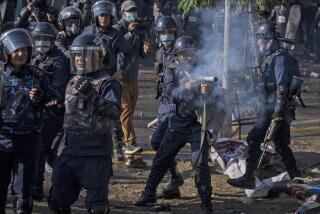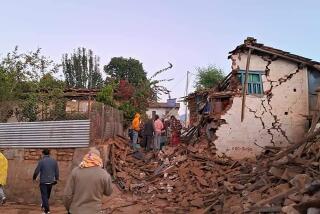Fuel and Fresh Food Running Low as Protests Spread Through Nepal
- Share via
KATMANDU, Nepal — Security forces fatally shot a fifth protester Monday as defiance of royal rule continued to spread through a paralyzed Nepal.
Twelve days of often bloody pro-democracy protests and a general strike have emptied Nepal’s highways, and cities were running low on fresh food and fuel.
At one Katmandu hotel, Monday’s dinner menu was scribbled on a pink Post-it.
Early today, armored military vehicles began escorting a convoy of trucks carrying supplies and a few passengers toward the capital. The convoy had spent Monday night inside an army camp about 90 miles south of Katmandu.
The protests are the most serious threat to the rule of King Gyanendra since he seized power 14 months ago.
As darkness fell on the capital, an angry mob of thousands again rampaged on Katmandu’s edge -- blocking roads with burning barricades and hurling bricks at police, who responded with tear gas, rubber bullets and baton charges.
“We will hang Gyanendra over flames -- the king will burn!” yelled Arjun Prasad, 22, as he stood near a flaming pile of tires.
In Nijgadh, 75 miles south of Katmandu, thousands of protesters were marching through the town when security forces opened fire with live ammunition, killing one person, an official said.
Five seriously wounded protesters were hospitalized, said the official, who spoke on condition of anonymity because he was not authorized to talk to reporters.
Daily protests have hit nearly ever major city since the opposition campaign began April 6.
Sunday saw upward of 50,000 people march across Nepal, and on Monday tens of thousands returned to the streets, many chanting for the king to be ousted or simply killed -- a rare sentiment in a land where monarchs have for generations been revered as Hindu god-kings.
“There is increasing defiance, there are more and more people coming to participate,” said Yubaraj Ghimire, editor of the newsmagazine Samay.
Gyanendra is “now reviewing the whole situation,” he said. “He’s meeting with people he’s been avoiding,” such as the ambassadors of the United States, India and China.
The king appeared Monday to be seriously considering relinquishing at least some of the power he seized -- a move he said was needed to restore political order and crush a communist insurgency that has left nearly 13,000 people dead in the last decade.
A palace official said Gyanendra had met with two former prime ministers to explore the possibility of appointing a prime minister.
More to Read
Sign up for Essential California
The most important California stories and recommendations in your inbox every morning.
You may occasionally receive promotional content from the Los Angeles Times.










